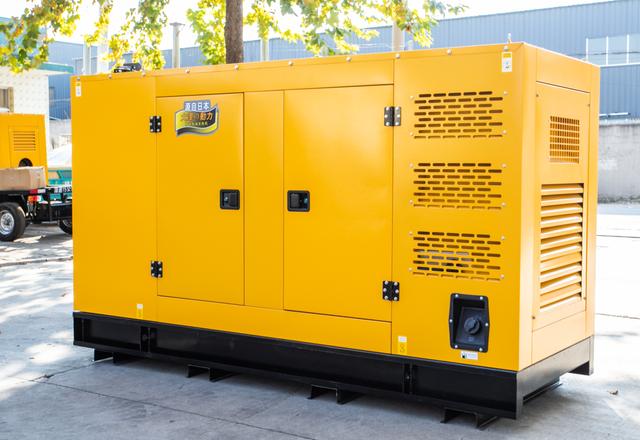Introduction
In dusty conditions, the performance and reliability of diesel generators can be significantly impacted. Dust and other particulate matter can infiltrate the generator components, leading to reduced efficiency, increased wear and tear, and potential breakdowns. It is crucial for businesses and organizations operating in dusty environments to choose diesel generators specifically designed to withstand these challenges. This article will explore the importance of selecting the right diesel generator for dusty conditions, the key considerations to keep in mind, and the best practices for maintaining and operating these generators in challenging environments.
Understanding the Impact of Dust on Diesel Generators

Dust is a common challenge in many industrial and construction sites, mining operations, and remote locations where diesel generators are often used to provide a reliable source of power. When dust particles infiltrate a diesel generator, they can cause a range of issues that affect its performance and longevity. Some of the common problems associated with dust exposure include:
1. Clogging of Air Filters: Dust particles can accumulate in the air filters of a diesel generator, blocking the airflow and reducing the efficiency of the combustion process. This can lead to incomplete fuel combustion, increased fuel consumption, and reduced power output.
2. Abrasive Wear: Dust particles can act as abrasive agents, causing accelerated wear and tear on engine components such as pistons, cylinders, and bearings. This can lead to premature failure of critical parts and costly repairs.
3. Overheating: Dust accumulation on the radiator and cooling fins can hinder the heat dissipation process, causing the engine to overheat. Overheating can lead to engine damage, reduced efficiency, and potential shutdown of the generator.
4. Electrical Issues: Dust can also infiltrate the electrical components of the generator, causing short circuits, corrosion, and malfunctions in the control systems. This can disrupt the operation of the generator and compromise its reliability.
Key Considerations for Diesel Generators in Dusty Conditions
When choosing a diesel generator for dusty conditions, there are several key considerations to keep in mind to ensure optimal performance and longevity. Some of the critical factors to consider include:
1. Dust Ingress Protection: Look for diesel generators that are specifically designed with robust dust ingress protection features, such as sealed enclosures, dust filters, and gaskets. These features help prevent dust from entering the engine and other critical components, ensuring reliable operation in dusty environments.
2. Air Filtration System: Opt for diesel generators with high-efficiency air filtration systems that can effectively capture and remove dust particles from the intake air. Regular maintenance of the air filters is essential to prevent clogging and ensure proper airflow to the engine.
3. Cooling System Design: Consider diesel generators with well-designed cooling systems that are resistant to dust accumulation. Look for generators with protected radiators, fan guards, and efficient cooling fins to prevent overheating in dusty conditions.
4. Engine Protection: Choose diesel generators equipped with advanced engine protection systems, such as automatic shutdown mechanisms for overloading, overheating, and low oil pressure. These safety features help prevent damage to the engine and ensure safe operation in challenging environments.
5. Corrosion Resistance: Dust particles can contain corrosive elements that can accelerate rust and corrosion on metal surfaces. Select 600kw diesel generator for remote monitoring stations with corrosion-resistant coatings and materials to prolong the lifespan of the generator in dusty conditions.
Best Practices for Maintaining Diesel Generators in Dusty Environments
In addition to selecting the right diesel generator for dusty conditions, proper maintenance and operational practices are essential to ensure the longevity and reliability of the generator. Some best practices for maintaining diesel generators in dusty environments include:
1. Regular Inspection: Conduct routine visual inspections of the diesel generator to check for signs of dust accumulation, wear and tear, and other issues. Pay close attention to the air filters, cooling system, electrical components, and engine parts.
2. Filter Replacement: Replace the air filters of the diesel generator at regular intervals as recommended by the manufacturer. Clogged air filters can restrict airflow and lead to engine performance issues, so timely replacement is crucial for optimal operation.
3. Cleaning: Regularly clean the exterior surfaces of the diesel generator to remove dust buildup and debris. Use compressed air or a soft brush to clean the radiator, cooling fins, and other components prone to dust accumulation.
4. Proper Ventilation: Ensure proper ventilation around the diesel generator to prevent the buildup of dust in the surrounding area. Install dust barriers or enclosures to protect the generator from excessive dust exposure.
5. Scheduled Maintenance: Follow the manufacturer's recommended maintenance schedule for the diesel generator, including oil changes, filter replacements, and inspections. Scheduled maintenance helps identify potential issues early and prevent costly breakdowns.
Conclusion
In dusty conditions, diesel generators play a critical role in providing a reliable source of power for various applications. To ensure optimal performance and longevity of diesel generators in dusty environments, it is essential to choose generators with robust dust protection features, maintain them regularly, and follow best practices for operation and maintenance. By selecting the right diesel generator and implementing proper maintenance practices, businesses and organizations can mitigate the impact of dust on their power supply and ensure uninterrupted operation in challenging environments.
